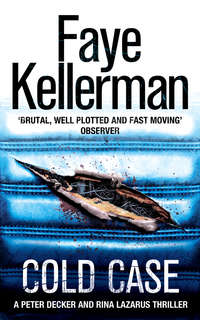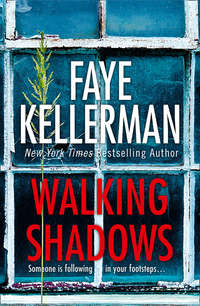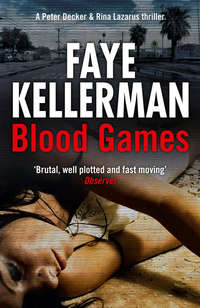
Полная версия
Sacred and Profane
I’ll bet he is, thought Decker.
“You’d better go see what she wants,” he said.
She left him alone with his baloney sandwich, carrot sticks, potato chips, and chocolate cupcake. He’d been over at Rina’s house last night while she was making lunches for the boys and she’d offered to pack him something. He had agreed under the condition that she’d go to no extra bother—give him exactly what she was making for the boys.
Are you sure, Peter?
Positive.
Hence, the kiddie lunch.
He unwrapped the sandwich. At least, it was on rye. He took a bite and in walked Hennon.
“Don’t bother to get up,” she said motioning him back down. “Finish swallowing.”
He did and put down the sandwich.
“Want some coffee?” she asked.
“Sure.”
“Kelly,” she called out. “Two black coffees, one with sugar.”
The receptionist ambled into the office, sulking. “It’s my lunch hour, Dr. Hennon.”
Hennon stared her down and a moment later Kelly brought in two styrofoam cups.
“Have a good lunch,” said Hennon.
The girl mumbled and slammed the door as she left.
“I would have fired her a long time ago, but my partner has a soft spot in his heart and a hard spot somewhere else for her. Speaking of true love, how’s your ‘sort of’ girlfriend, Pete?”
“She’s fine. She just bought a gun. You own a gun, Annie?”
“No. I’d probably maim myself. Why’d she buy one? Just feeling vulnerable?”
“About six months ago, a psycho almost raped her. She’s still nervous about it. Claims she hears noises outside.”
She whistled. “If I were her, I’d buy a gun, also.”
“I thought you’d say that.”
“You carry a picture of her?”
“Who? Rina?”
“If that’s her name.”
Decker dug out his wallet and showed the dentist a snapshot. Hennon frowned.
“Is this an exceptionally good photo of her?”
“Neither exceptionally good nor bad. It’s what she looks like.”
The dentist handed him back his wallet.
“Shall we get down to business?” she asked.
Decker said, “What do you have?”
She flipped on the viewing monitor.
“I went down to the morgue this weekend. Dr. Marvin Rothstein sent me a set of X rays that looked promising as one of our Jane Does. This is the original full mouth set I took on Jean—twenty shots. Compare these to Dr. Rothstein’s set.”
She let Decker look for a minute.
“There are similarities,” she said, “Same number of teeth, same teeth in the mouth have been restored, same interdental spacing, except that everything looks a little off kilter—like looking in a mirror at a funhouse. For instance, this right bitewing molar shot that I took on Jean shows the amalgam—the silver filling—covering the top of the upper molar and two sides: a typical filling for this tooth called an MOD. The angle I took it from shows a little tiny sliver of filling extending past the preparation line. It’s called an overhang and it’s a teeny one. Rothstein’s X rays don’t show it all.”
“Meaning?”
“I’m coming to that. Take a look at this, Pete. This one is the full mouth set of Jean that I shot over the weekend,” she said mounting another set of X rays on the viewer. “Now compare this set to Dr. Rothstein’s.”
Decker studied the films.
“It doesn’t show the sliver of filling, either.”
“Exactly. And look how much more similar the two sets are. Know what I did? I angled the X ray tube a little bit forward. Foreshortened the beam. When one compares radiographs for something as important as identification of a murder victim, one better make damn sure that the two sets of X rays are shot from the same angle. Otherwise, one may miss an obvious match and feel stupid.”
She breathed on her fingernails and rubbed them on her white coat.
“But the clincher is this. I called up Dr. Rothstein and asked for the patient’s orthodontist. His name is Dr. Neiman and he sent me her casts. You want to compare the two?”
She showed them to Decker.
“To me, they look identical.”
“Not quite. Remember I told you that the girl wasn’t wearing her retainer as much as she should have. The skeleton’s teeth weren’t quite as aligned. But even so, I superimposed a bite plate of Jean’s teeth and matched it to his patient’s casts, and then I reversed the procedure and superimposed the patient’s bite plate over Jean’s teeth. It’s the same person.
“Pete,” she said, pointing to the plaster casts. “Say hello to Lindsey Bates.”
5
At the time of the Missing Persons Report three and a half months ago, Lindsey Bates had been sixteen years and two months old, five feet four inches tall, 108 pounds, with blue eyes, blond hair—American pie turned vulture fodder. Last seen by her mother after announcing that she was going to the Glendale Galleria to find a hot pink blouse to match her new yellow baggies. She’d planned to be back around four, and when she hadn’t returned by five, Mrs. Bates began to worry. Forty-eight hours later, Lindsey was considered an official Missing Person. There were several other entries in the file—interviews with parents and friends—but nothing had proven useful.
The Glendale detective assigned to the case had been Don Oldham, an energetic, overweight man of fifty, who had reached twenty-five biggies a month ago and hung up his shield. After the Bates identification was made and the parents notified, Decker visited him in his condo that overlooked the smoggy San Gabriel mountains. Some say retirement kills the spirit, but if there existed a happier man than Oldham (Donnie as he insisted on being called) Decker hadn’t met him. Oldham was an avid tropical fish breeder, and he reminded Decker of a mad scientist as he tested water samples and added chemicals to the fifty aerated aquariums that filled his living room. The tanks gurgled and bubbled like boiling cauldrons. It took Donnie nearly twenty minutes to get down to business.
He remembered the case. His conclusion was profound: Either an abduction or a runaway.
Did he favor one over the other, Decker asked.
Oh, probably the abduction, said Oldham. None of the girl’s personal effects seemed to be missing. Her car was still in the parking lot. People don’t leave without taking some memento along.
But then again, he added gleefully, she still could have been a runaway.
Decker thanked him. As he turned to leave, he saw Oldham taking off his shirt and dipping his bare arms into a tank of guppies. A caved-in patch of glossy scar tissue decorated the man’s right shoulder. Decker wondered how he’d caught the bullet.
He arrived back at the squad room shortly after noon and found Marge at her desk, looking sick.
“What’s wrong with you?” he asked.
“Chug-a-lugged too many beers,” she answered, pushing hair out of her eyes. The blond strands hung limply down to her shoulders. Her complexion was wan.
“You don’t look hungover; you look sick. As in the flu. Why don’t you go home?”
She dismissed the thought with a wave of her hand. “The aspirins’ll kick in. I’ll be all right.”
“What are you working on now?” Decker asked.
“I just got another weenie wagger. Third one in a week. Seems this particular dude just loves to excite himself in the movie theater, preferably kiddy films. They caught him at the climax—his—buttering some little girl’s popcorn at the Brave Li’l Mouse Movie.”
Decker groaned.
“Mama went bonkers,” Marge continued. “Started screaming in front of a full house. ‘Did you see what that man just did! He ejaculated in my daughter’s popcorn!’ Meanwhile, the perv’s just sittin’ there with this smug grin plastered across his mug. No resistance to the arrest. Too damn wasted.”
“I hope they got their money back,” Decker said.
“Yeah, they did—and a free popcorn to boot—but Mama was none too pleased.”
“Do you have any other cases—besides the wagger—that are pressing?”
“My load’s pretty light. What’s up?”
“We got a name to match a set of bones that we dug up.”
Marge nodded approval. “Not too shabby, Pete.”
“Sometimes you get lucky. A sixteen-year-old white female named Lindsey Bates. Disappeared around four months ago.”
“Want me to talk to her mother?”
“If you can. I need someone with a soft touch.”
“When?”
“Right now, if you feel up to it. I figured I’d take a peek at the kid’s room while you interviewed Mrs. Bates.”
Marge stood up. In heels, she was nearly eye level with him. Her shoulders, housed in a padded jacket, appeared immense.
She picked up her bag and said, “Let’s go.”
The Bateses lived in La Canada. The house was on a tree-lined street at the end of a cul-de-sac—a split level with a wood and stone facade. The lawn had been newly planted and was bisected by a stone walkway lined by manicured rose bushes bursting with Day-Glo colors—hot pinks, scarlet reds, and sunshine yellows—a wreath for the house of mourning. Marge gave the door a hard rap, and a moment later a wisp of a blonde appeared in the doorway.
“Mrs. Bates?” Decker asked, showing his shield.
“Come in, Sergeant … I’m sorry I forgot your name.”
“Decker, ma’am.” He handed her his card. “This is Detective Dunn.”
“I’m very sorry for your loss, Mrs. Bates,” Marge said, gently.
Mrs. Bates acknowledged the condolences by lowering her head. Under a different set of circumstances she might have been pretty, but sorrow had washed out her face, blurring her features. Her eyes were sunken, the blue iris faded. The cheeks sagged, the mouth was slack and pale. Her coloring was fair, as her daughter’s had been, but her hair was stringy and unwashed. She seemed to wilt under the detectives’ eyes and made a futile attempt to straighten her housecoat.
“Forgive my appearance,” she said in a whisper.
Decker placed a hand on her small, bony shoulder.
“Mrs. Bates, I’m very sorry to intrude upon you at a time like this. Thank you for your cooperation.”
The woman’s eyes filled with tears.
“Please come in.”
They were led to the living room sofa—white velvet, and spotless. Everything in the room was spotless. She asked them if they wanted some coffee, but they both declined.
“If it’s all right with you, Mrs. Bates,” Decker began, “I’d like to take a look at Lindsey’s room.”
“What … What are you looking for?” she asked.
“Nothing specific,” he answered.
That was the truth. But it was more tangible than that. He was trying to get a feel for Lindsey so he could relate to her as a living entity. Her room would be a logical starting place. Rooms and luggage. Ever want to do a quick analysis of a person, find out what he packs for a weekend jaunt.
“I guess that would be okay,” Mrs. Bates said hesitantly. “It’s down the hall, the third door to the left. The one that’s … that’s closed.”
Decker thanked her and left the two women alone.
Marge waited until Mrs. Bates spoke.
“I don’t know what I could possibly tell you that I didn’t already tell the police the first time around,” she said.
“If you’re ready,” Marge said. “I’d like you to recount what happened the day of Lindsey’s disappearance.”
Mrs. Bates peered into her lap and Marge took advantage of the opportunity to slip out her notepad.
“It was a Saturday,” she began. “I can’t believe that she’s actually …”
She paused to catch her breath, then asked imploringly.
“It is possible they made a mistake? After all, how could they make such an important decision based on teeth?”
“They seem to be sure—”
“But it’s only teeth!”
“I wish I could tell you differently, Mrs. Bates,” Marge said, quietly. “If I had any doubts, I wouldn’t be here. But we seem to be quite certain that we found your daughter. I’m so sorry. It must be so hard to accept that.”
“I hope you’ll never know.” Mrs. Bates dropped her head in her hands and sobbed. Marge offered her a Kleenex and she blew her nose. Then she tried again.
“As I started to say, it was a Saturday …” She started crying again.
Marge put down her pad. “Maybe we came too soon for you to do this. It’s not because we’re callous. It’s just that every second we let slip by is less time for us to do our job and more time for your daughter’s murderer to get away. But if this is too hard on you, we can come back tomorrow.”
Mrs. Bates dried her tears and shook her head no. “I’m all right.”
“Sure?”
“Yes,” Mrs. Bates said. “What was I saying?”
“It was Saturday,” Marge answered, taking up her pad.
“Yes, Saturday,” Mrs. Gates repeated. “Lindsey said she was going to the Galleria to shop, to look for a blouse … she’d just started driving and the mall was close to home …” She threw up her hands. “What else can I tell you? That was the last anyone ever heard of her … until now.”
“Do you know if she was planning to meet someone?” Marge asked.
Mrs. Bates’s face turned livid.
“The original detective asked me the same question. Don’t police ever read each other’s reports?”
“I like to be thorough,” Marge explained.
The woman sank back into her chair. “I’m terribly sorry for my behavior—”
“No, don’t apologize. You’re doing fine.”
“As far as I know,” Mrs. Bates said, “she wasn’t going to meet anyone. I can give you a list of all of her friends and you can ask them if Lindsey called them.”
“Thank you. That would be helpful.” She continued. “Do you know the stores your daughter routinely shopped at?”
“Bullocks, Broadway, May Company, Robinson’s. She like Contempo, although I always thought they were a little on the high side.”
“Did she follow a certain routine when she shopped? Park in the same place? Comb the stores in the same pattern?”
“Not that I know of. Her friends could tell you better than I can.” Her facial expression became wistful. “We used to shop together years ago, but you know kids … They like to be with their friends … Lindsey loved my taste in clothes. People often mistook us for sisters.”
Marge couldn’t see it. But the woman had probably aged ten years since her daughter’s disappearance. She consulted the notes Decker had prepared for her.
“Lindsey has a younger sister, correct?”
“Yes.”
“Were they close?”
“Yes,” she answered, with a defensive note to her voice. “We’re a very close family.”
“And she’s at school now?”
“Yes. Erin’s at school.” As if she were reassuring herself.
“I’d like to talk to her, also.”
The woman’s eyes darkened.
“Why? Do you think the girls were keeping secrets from me?”
“It’s routine, I assure you, Mrs. Bates.”
Mrs. Bates bit her lip.
“If you think it’s necessary.”
Marge nodded.
“The girls are … were very different,” Mrs. Bates mumbled.
“In what way?”
“I’m … I was closer to Lindsey. We shared more interests. She was the sweetest thing on two feet, Detective. And beautiful inside and out.”
“And Erin?” Marge prompted.
“Erin’s more of an individual. But she’s a good girl also.”
“I’m sure she is,” Marge said. “The Glendale police interviewed Lindsey’s friends. She seemed to have had a lot of them.”
“What can I tell you, Detective? She was very popular.”
“Did you know most of her friends?”
“Yes. Our home was their hangout.” Again eyes welled up with tears. “I miss the noise.”
“Did Lindsey have a boyfriend?”
She shook her head. “Her father and I discouraged her from getting too involved with anyone special. A sixteen-year-old girl doesn’t need an immature boy breathing down her neck, monopolizing her attention. That’s how kids get into trouble.”
The irony wasn’t evident to her, and Marge talked quickly to keep it that way.
“But she dated?”
“She went out in groups with her friends. We knew all her friends, Detective. They’re nice kids.”
“What kind of student was she?”
“She didn’t have a head for academics, but she passed her classes.” She sighed. “We had tutors, but we decided against college for her … her charm was her kindness and beauty. You’ve seen her picture. A lovelier girl never existed.”
Marge agreed with her.
“She was head junior cheerleader,” Mrs. Bates continued. “She had to compete with one hundred girls for that spot, but she knew she’d win. That’s the type of girl she is.”
Marge didn’t correct her tense.
“Was she involved in other extracurricular activities besides cheerleading?”
“She was on the tennis team. What a backhand!” The woman came alive, revitalized by the memory.
“What was her weekday routine, Mrs. Bates?”
“School at 8:10. Monday, Wednesday, and Friday, tennis team from 3:15 to 4:30. Cheerleading practice was every day from five to seven. On Wednesday and Thursday nights at eight she had patch—ice skating, Once a week, on Tuesday, piano lessons. She loved to be active. She has an incredible energy level, unlike Erin who’s a—.”
She fell silent. Tension between Erin and Mom, Marge noted in her pad. She asked, “Did Lindsey go out on weekends?”
“Yes. But she had to be in by ten.”
Marge smiled, trying to look benign.
“Mrs. Bates, how would you describe your relationship with your daughter?”
“We were very close,” she said. “My daughter was not a runaway.”
“I’m sure she wasn’t,” Marge said quickly. She noticed Mrs. Bates was digging her nails into her hands.
Keep her talking.
“Do you happen to know if Lindsey kept a diary?” Marge asked.
One nail broke skin. There was blood.
“She did, didn’t she?” Marge said.
“I know she kept one,” Mrs. Bates admitted. “I haven’t been able to find it. Everything else is the way it always was. Her clothes, her money, her records, her jewelry—and most of it isn’t cheap, costume junk—sentimental mementos, her awards. But I … I can’t seem to find her diary.”
Because she ran away from home and took it with her, Marge thought. That’s why you haven’t been able to find it.
She asked her some wind-down questions about Lindsey. What emerged from Mrs. Bates’s answers was a shell of a girl, a sweet kid who never disobeyed her mother. Marge decided to wrap up the interview since nothing enlightening was likely to come out of it.
“After the police failed to find her, did you try to locate her yourself, Mrs. Bates?” she asked. “Did you and your husband hire anyone to try and find her?”
The woman lowered her head.
“Who’d you hire, Mrs. Bates?”
“It was a reputable firm. The Marris Association.”
Marge agreed they were reputable.
“And expensive,” Mrs. Bates grumbled. “They wasted thousands of our dollars and came up with nothing.”
“Who was the private investigator assigned to the case?”
“His name was Lee Krasdin. And older, fat man with a disgusting red face. Didn’t do a damn thing! I don’t think he ever left his office.”
“I’d like to talk to him. Would you do me a favor? Would you ask him to release your daughter’s report to me? Otherwise I’m going to have to get a subpoena—”
“Of course,” she said. “I’ll call him up right now.”
“How about if I call him up and you write me out a release statement for your daughter’s records?”
“Fine.”
“And I’ll need that list of your daughter’s friends.”
“Of course.”
Marge called the Marris Agency and said someone would be there in an hour to pick up the file. She was putting the final touches on her notes when Mrs. Bates returned with a few sheets of paper.
“Here,” she said, standing over the detective. She smelled slightly stale, as if her clothes hadn’t been washed recently.
“This is the list and this is the release statement. Does it say what you want it to say?”
“It’s fine,” Marge said. “I appreciate your taking the time out to talk to me, Mrs. Bates.”
“That’s all right,” she answered softly. “If I think of anything else, I’ll let you know.”
“That would be fine.” Marge saw Decker standing off to the side. How long he’d been there, she didn’t know. It was good that he didn’t intrude. His size could sometimes be intimidating. Marge thought that this was one of the times.
She said, “Oh, Sergeant Decker’s back.”
“Just about done?” he asked, entering the room.
“Yes,” Marge answered, winking at him. “Perfect timing.”
“Did you find anything illuminating?” Mrs. Bates asked Decker. He noticed anxiety in her voice.
“Not really. It’s just a teenage girl’s room,” he said; then added quietly, “not unlike others I’ve seen.”
Like my own kid’s, he thought.
Mrs. Bate’s eyes began to swell with tears.
“I’m so sorry,” Decker said.
She nodded.
“Mrs. Bates,” he asked, “did your daughter ever know someone who was deaf or hard of hearing?”
The question took her by surprise.
“No. Why do you ask?”
“It may be important.”
“How so?”
“I’m not really sure. But as soon as I am, I’ll let you know.”
“A hearing aid?” the woman asked.
Decker said yes.
“No, I don’t believe so,” she answered, deep in thought. “Maybe I can ask Erin … when does she get home? … Let’s see, it’s Wednesday … Thursday? … I think it’s Thursday …”
She realized she’d been talking to herself and gave an apologetic smile.
“Also, I’d like to talk to your husband when it’s convenient for him,” Decker said. “May I call him at home tonight to arrange an appointment?”
“Certainly.”
Marge flipped her notebook shut.
“You’ll keep me abreast?” Mrs. Bates asked.
“Of course,” replied Marge.
Mrs. Bates wrapped herself in her arms and began to knead them like dough.
“I loved my daughter,” she said. “I want you to catch the monster that … that killed her. But perhaps you can understand if I tell you that maybe I’m better off not knowing everything.”
Decker flashed to his own daughter.
“I understand,” he said.
“What’d you find out?” Decker asked Marge. He turned on the ignition, let the motor idle for a moment, then backed out of the driveway.
“Mom liked to shop with her daughter,” answered Marge.
“The usual denial?”
Marge nodded. “Not my kid! She couldn’t have run away.” She rubbed her hands together. “They fix the car heater yet? Day’s turned nasty.”
“No, but the air-conditioner works perfectly.”
“Terrific. Why don’t we chill up the inside so the outside’ll feel warm by comparison?”
Decker laughed. “You’re looking a little better,” he said.
“You talk to people with real problems, you all of a sudden don’t feel so sick,” she said. “What’d you find in Lindsey’s room?”
Decker said, “I found an average, nice kid. Not too deep, but not angry, either. Her records were standard top forty stuff, no heavy metal or rebellious punker crap. Her clothes were a bit more adventurous than preppy, but definitely not punk, either. She was into her nails in a big way. Found at least a half dozen nail kits.”
He pulled onto the freeway and floored the gas pedal. The car protested, bucked, then surged ahead.
“Girl didn’t read at all. Her book shelves were filled with knick-knacks and stuffed animals. Not a single book.”
“Posters?” Marge asked.
“Rock stars, a few of the top New York models. A few framed homilies—Love conquers all … love is the treasure of kings, Love is the treasure of life. Stuff like that.”
“A nice kid,” Marge said.
“A nice kid,” Decker said.
“Pictures of boyfriends?” Marge asked.
“Couldn’t find any. Couldn’t find any snapshots in her room. The family probably keeps photo albums in a different place.”
“You didn’t by any chance happen to come across a diary?”
Decker shook his head. “She kept one?”









